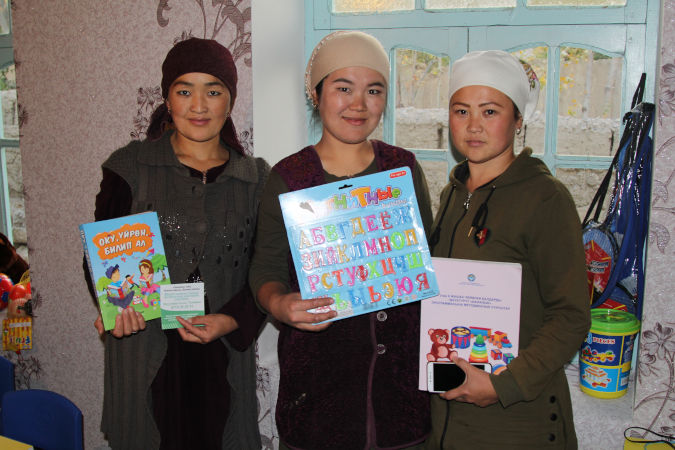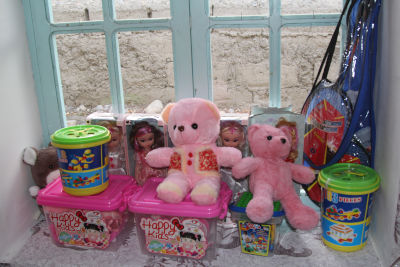Peacebuilding is placed in women's hands through new initiative in Kyrgyzstan and Tajikistan
Date:

Empowering women living along contentious parts of the border between Kyrgyzstan and Tajikistan with new knowledge, skills and business acumen is bringing civilians from both countries together where land disputes and resources feuds have regularly fueled longstanding tensions.
Through 36 self-help groups, UN Women in Kyrgyzstan worked with more than 200 women along the border, training them on sustainable and green entrepreneurship, efficient natural resource management and gender equality. These women-led groups were invited to prepare plans for small-scale initiatives across the border municipalities of Batken oblast, that were further supported by the project. Following a training course run by UN Women, 27-year-old Jusupbek kyzy Tahmina set-up a self-help group called: Kelechek (future).
“During the trainings, we recognized that peacebuilding starts from early childhood,” Tahmina said. Two of the women in the group were experienced kindergarten teachers, and, as young mothers, the group’s members also knew the difficulties with finding adequate pre-school options in their areas, with a big waiting list to a local kindergarten.
Using what they learned about entrepreneurship, business planning, financial literacy, the role of women in peacebuilding processes and more, the women opened a child development center. In addition to hourly childcare services for those aged 1 to 5 years, the centre also offers courses in English and Russian languages, pre-school and cognitive development.

Center for childcare in Koktash village, Aksay municipality, Photo: UN Women/Kiyal Tilebdaldiva
“Now we try to use cartoons, group games as a pedagogy tool to promote peacebuilding ideas among children. To teach children to be more tolerant towards diverse groups, we, teachers and parents need to start from ourselves, and show by our own examples. In this way we contribute to social cohesion and peacebuilding in our community and country,” Tahmina explained.
Among the participating groups, 22 groups have prepared business plans, outlining a specific problem and how their solution could help reduce women and girls’ vulnerabilities in the area, while also contributing to cross-border partnership and peace building. The business plans were assessed by a selection committee involving UN Women project staff and respective local self-government representatives, that approved 17 initiatives for project support.
As a result, many new initiatives are now taking shape and helping to improve lives. For example, in addition to Kelechek’s child development center, another centre for school students and women was opened in Arka village, Janyjer municipality, offering courses in Russian language, computer literacy and music. Meanwhile, the medical service center in Ortoboz village, Aktatyr munciplaity, now offers physiotherapy and ultrasound scanning for border village inhabitants of both countries.
At the same time, six groups are now running profitable agro-business and conflict-resolution initiatives, such as growing strawberries using agro-textiles and drip irrigation systems, beekeeping, goat keeping, and milk processing workshops. Another seven groups are working on expanding sewing workshops and preparing bakery products.
These initiatives have not only increased women’s incomes in the cross-border areas, they are also set to foster entrepreneurial partnership across the border. Participating women also say they gained new ideas and confidence, moving away from a passive role of mere observers.
“We’re happy to share the knowledge and experience that we gained, so that others living in this village can plan and achieve their dreams,” said Murzamatova Shayyrgul, the Kelechek treasurer. “Participation in the project gave us useful experience and opportunities to improve the welfare of young women in Koktash village. And consultations and advice from trainers gave us the impetus to move forward, having an understanding that the solution to pressing problems is not in ‘someone's hands’, but in our own hands," she said.
The UN Peace-building Fund’s Cross-border Cooperation for Sustainable Peace and Development is implemented in partnership with several UN agencies (FAO, UNDP, UNICEF, UN Women and WFP) working in both Kyrgyzstan and Tajikistan. The project covers six clusters of cross-border villages that experience high and medium conflict potential in the border areas of Sughd, Tajikistan and Batken, Kyrgyzstan. The project aims to build sustainable ways of reducing the risk of violent conflict and creating a more conducive environment for sustainable peace and development.